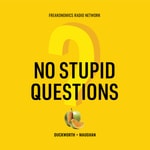No Stupid Questions – Détails, épisodes et analyse
Détails du podcast
Informations techniques et générales issues du flux RSS du podcast.

No Stupid Questions
Freakonomics Radio + Stitcher
Fréquence : 1 épisode/7j. Total Éps: 278

Classements récents
Dernières positions dans les classements Apple Podcasts et Spotify.
Apple Podcasts
🇨🇦 Canada - societyAndCulture
29/07/2025#54🇨🇦 Canada - societyAndCulture
28/07/2025#54🇺🇸 États-Unis - societyAndCulture
28/07/2025#95🇨🇦 Canada - societyAndCulture
27/07/2025#87🇨🇦 Canada - societyAndCulture
26/07/2025#82🇨🇦 Canada - societyAndCulture
25/07/2025#68🇨🇦 Canada - societyAndCulture
24/07/2025#62🇨🇦 Canada - societyAndCulture
23/07/2025#51🇬🇧 Grande Bretagne - societyAndCulture
23/07/2025#79🇺🇸 États-Unis - societyAndCulture
23/07/2025#88
Spotify
Aucun classement récent disponible
Liens partagés entre épisodes et podcasts
Liens présents dans les descriptions d'épisodes et autres podcasts les utilisant également.
See all- https://brenebrown.com/
436 partages
- https://www.tonyrobbins.com/
368 partages
- https://teamcoco.com/
243 partages
- https://en.wikipedia.org/wiki/Elon_Musk
121 partages
- https://en.wikipedia.org/wiki/Steve_Jobs
83 partages
- https://en.wikipedia.org/wiki/Bill_Gates
27 partages
Qualité et score du flux RSS
Évaluation technique de la qualité et de la structure du flux RSS.
See allScore global : 69%
Historique des publications
Répartition mensuelle des publications d'épisodes au fil des années.
209. Why Do We Settle?
Épisode 209
dimanche 1 septembre 2024 • Durée 35:02
Why does the U.S. use Fahrenheit when Celsius is better? Would you quit your job if a coin flip told you to? And how do you get an entire country to drive on the other side of the road?
- SOURCES:
- Christian Crandall, professor of psychology at the University of Kansas.
- Stephen Dubner, host of Freakonomics Radio and co-author of the Freakonomics books.
- Scott Eidelman, professor of psychology at the University of Arkansas.
- David Hume, 18th century Scottish philosopher.
- Ellen Langer, professor of psychology at Harvard University.
- Steve Levitt, professor emeritus of economics at the University of Chicago, host of People I (Mostly) Admire, and co-author of the Freakonomics books.
- John McWhorter, professor of linguistics, English, and comparative literature at Columbia University.
- Mark Twain, 19-20th century American writer.
- RESOURCES:
- "What Countries Use the Imperial System?" by William Harris and Sascha Bos (HowStuffWorks, 2023).
- "UK Quietly Drops Brexit Law to Return to Imperial Measurements," by George Parker (Financial Times, 2023).
- "Heads or Tails: The Impact of a Coin Toss on Major Life Decisions and Subsequent Happiness," by Steven D. Levitt (The Review of Economic Studies, 2021).
- "A ‘Thrilling’ Mission to Get the Swedish to Change Overnight," by Maddy Savage (BBC, 2018).
- "Why We Can’t Quit the QWERTY Keyboard," by Rachel Metz (MIT Technology Review, 2018).
- "Why Americans Still Use Fahrenheit Long After Everyone Else Switched to Celsius," by Zack Beauchamp (Vox, 2015).
- "The Intuitive Traditionalist: How Biases for Existence and Longevity Promote the Status Quo," by Scott Eidelman and Christian Crandall (Advances in Experimental Social Psychology, 2014).
- "What Scientific Concept Would Improve Everybody's Cognitive Toolkit?" (Edge, 2011).
- "Mars Probe Lost Due to Simple Math Error," by Robert Lee Hotz (Los Angeles Times, 1999).
- EXTRAS:
- "Would You Let a Coin Toss Decide Your Future?" by Freakonomics Radio (2013).
- "The Upside of Quitting," by Freakonomics Radio (2011).
208. Can A.I. Companions Replace Human Connection?
Épisode 208
dimanche 25 août 2024 • Durée 35:31
What happens when machines become funnier, kinder, and more empathetic than humans? Do robot therapists save lives? And should Angela credit her virtual assistant as a co-author of her book?
- SOURCES:
- Robert Cialdini, professor emeritus of psychology at Arizona State University.
- Reid Hoffman, co-founder and executive chairman of LinkedIn; co-founder and board member of Inflection AI.
- Kazuo Ishiguro, novelist and screenwriter.
- Ethan Mollick, professor of management and co-director of the Generative A.I. Lab at the Wharton School of the University of Pennsylvania.
- Ann Patchett, author.
- Kevin Roose, technology columnist for The New York Times and co-host of the podcast Hard Fork.
- Niko Tinbergen, 20th-century Dutch biologist and ornithologist.
- Lyle Ungar, professor of computer and information science at the University of Pennsylvania.
- E. B. White, 20th-century American author.
- RESOURCES:
- Co-Intelligence: Living and Working with AI, by Ethan Mollick (2024).
- "Meet My A.I. Friends," by Kevin Roose (The New York Times, 2024).
- "Loneliness and Suicide Mitigation for Students Using GPT3-Enabled Chatbots," by Bethanie Maples, Merve Cerit, Aditya Vishwanath, and Roy Pea (NPJ Mental Health Research, 2024).
- "AI Can Help People Feel Heard, but an AI Label Diminishes This Impact," by Yidan Yin, Nan Jia, and Cheryl J. Wakslak (PNAS, 2024).
- "Romantic AI Chatbots Don’t Have Your Privacy at Heart," by Jen Caltrider, Misha Rykov and Zoë MacDonald (Mozilla Foundation, 2024).
- Klara and the Sun, by Kazuo Ishiguro (2021).
- The Study Of Instinct, by Niko Tinbergen (1951).
- Pi.
- EXTRAS:
- "Are Our Tools Becoming Part of Us?" by People I (Mostly) Admire (2024).
- "Is GPS Changing Your Brain?" by No Stupid Questions (2023).
- "How to Think About A.I.," series by Freakonomics Radio (2023).
- "Would You Rather See a Computer or a Doctor?" by Freakonomics, M.D. (2022).
201. Are You Dreaming Too Big?
Épisode 201
dimanche 23 juin 2024 • Durée 41:44
Are fantasies helpful or harmful? How is daydreaming like a drug? And what did Angela fantasize about during ninth-grade English class?
- SOURCES:
- Patrick Bet-David, YouTuber and founding C.E.O. of PHP Agency Inc.
- Barbara Corcoran, "Shark" and executive producer on ABC’s Shark Tank and founder of The Corcoran Group.
- Peter Gollwitzer, professor of psychology at New York University.
- Danny Kahneman, professor emeritus of psychology at Princeton University.
- Robert Nozick, philosopher.
- Gabriele Oettingen, professor of psychology at New York University.
- Kim Scott, co-founder of Radical Candor and prominent C.E.O. coach in Silicon Valley.
- RESOURCES:
- "Dreamscrolling," by Empower (The Currency, 2024).
- "Most Americans Can’t Afford a $1,000 Emergency: Survey," by Travis Schlepp (The Hill, 2024).
- "Positive Fantasies and Negative Emotions in Soccer Fans," by A. Timur Sevincer, Greta Wagner, and Gabriele Oettingen (Cognition and Emotion, 2019).
- Radical Candor: Be a Kick-Ass Boss Without Losing Your Humanity, by Kim Scott (2017).
- "Pleasure Now, Pain Later: Positive Fantasies About the Future Predict Symptoms of Depression," by Gabriele Oettingen, Doris Mayer, and Sam Portnow (Psychological Science, 2016).
- "Positive Fantasies About Idealized Futures Sap Energy," by Heather Barry Kappes and Gabriele Oettingen (Journal of Experimental Social Psychology, 2011).
- "Self-Regulation of Goal Setting: Turning Free Fantasies About the Future Into Binding Goals," by Gabriele Oettingen, Hyeon-ju Pak, and Karoline Schnetter (Journal of Personality and Social Psychology, 2001).
- "Intuitive Prediction: Biases and Corrective Procedures," by Daniel Kahneman and Amos Tversky (DARPA Technical Report, 1977).
- Anarchy, State, and Utopia, by Robert Nozick (1974).
- EXTRAS:
- "Can You Really 'Manifest' Success Through Positive Visualization?" by No Stupid Questions (2024).
118. How Do You Keep Winter From Getting You Down?
Épisode 118
dimanche 9 octobre 2022 • Durée 34:02
How should you treat Seasonal Affective Disorder? Would we all be happier if we hibernated? And why does Stephen think football fans have an easier time?
117. What’s Wrong With Holding a Grudge?
Épisode 117
dimanche 2 octobre 2022 • Durée 37:27
How do you let go of resentment? Do apologies even work? And what grievances have Stephen and Angela been nursing for years?
116. Do People Pay Attention to Signs?
Épisode 116
dimanche 25 septembre 2022 • Durée 37:28
Do highway warnings save lives or cost lives? How do you keep men from peeing on the floor? And what’s Angela’s plan to get more people washing their hands?
115. Are You Having a Midlife Crisis?
Épisode 115
dimanche 18 septembre 2022 • Durée 39:06
How is aging different today than it was in the past? What do young people get wrong about happiness? And what does it mean if you impulsively decide to get your ear pierced in an unusual place?
114. Can You Learn to Love Hard Work?
Épisode 114
dimanche 11 septembre 2022 • Durée 36:32
Can exercising your body boost your brain's stamina? Are some people just born lazy? And why did Angela stop reading “Us Weekly”?
113. How Can You Improve Your Mental Endurance?
Épisode 113
dimanche 4 septembre 2022 • Durée 34:44
Why do some activities tire your brain more than others? How exhausting is poverty? And could most of the world’s problems be solved with a sandwich?
112. Is It Okay to Hate Highbrow Culture?
Épisode 112
dimanche 28 août 2022 • Durée 35:32
Are Europeans more sophisticated than Americans? What’s wrong with preferring Taylor Swift to Puccini? And is Steve Levitt “Team Edward” or “Team Jacob”?









